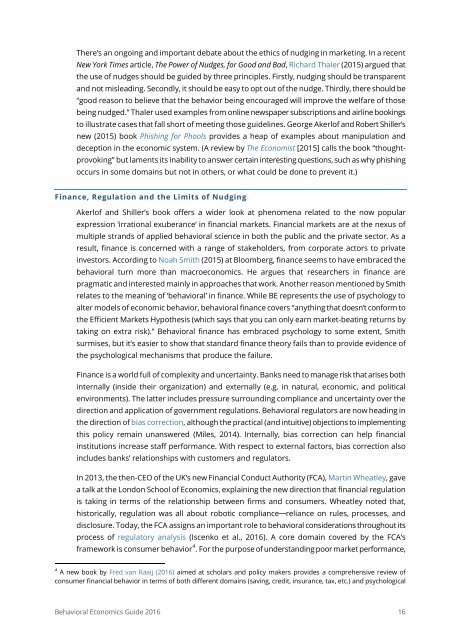THE BEHAVIORAL ECONOMICS GUIDE 2016
BEGuide2016
BEGuide2016
Create successful ePaper yourself
Turn your PDF publications into a flip-book with our unique Google optimized e-Paper software.
There’s an ongoing and important debate about the ethics of nudging in marketing. In a recent<br />
New York Times article, The Power of Nudges, for Good and Bad, Richard Thaler (2015) argued that<br />
the use of nudges should be guided by three principles. Firstly, nudging should be transparent<br />
and not misleading. Secondly, it should be easy to opt out of the nudge. Thirdly, there should be<br />
“good reason to believe that the behavior being encouraged will improve the welfare of those<br />
being nudged.” Thaler used examples from online newspaper subscriptions and airline bookings<br />
to illustrate cases that fall short of meeting those guidelines. George Akerlof and Robert Shiller’s<br />
new (2015) book Phishing for Phools provides a heap of examples about manipulation and<br />
deception in the economic system. (A review by The Economist [2015] calls the book “thoughtprovoking”<br />
but laments its inability to answer certain interesting questions, such as why phishing<br />
occurs in some domains but not in others, or what could be done to prevent it.)<br />
Finance, Regulation and the Limits of Nudging<br />
Akerlof and Shiller’s book offers a wider look at phenomena related to the now popular<br />
expression ‘irrational exuberance’ in financial markets. Financial markets are at the nexus of<br />
multiple strands of applied behavioral science in both the public and the private sector. As a<br />
result, finance is concerned with a range of stakeholders, from corporate actors to private<br />
investors. According to Noah Smith (2015) at Bloomberg, finance seems to have embraced the<br />
behavioral turn more than macroeconomics. He argues that researchers in finance are<br />
pragmatic and interested mainly in approaches that work. Another reason mentioned by Smith<br />
relates to the meaning of ‘behavioral’ in finance. While BE represents the use of psychology to<br />
alter models of economic behavior, behavioral finance covers “anything that doesn’t conform to<br />
the Efficient Markets Hypothesis (which says that you can only earn market-beating returns by<br />
taking on extra risk).” Behavioral finance has embraced psychology to some extent, Smith<br />
surmises, but it’s easier to show that standard finance theory fails than to provide evidence of<br />
the psychological mechanisms that produce the failure.<br />
Finance is a world full of complexity and uncertainty. Banks need to manage risk that arises both<br />
internally (inside their organization) and externally (e.g. in natural, economic, and political<br />
environments). The latter includes pressure surrounding compliance and uncertainty over the<br />
direction and application of government regulations. Behavioral regulators are now heading in<br />
the direction of bias correction, although the practical (and intuitive) objections to implementing<br />
this policy remain unanswered (Miles, 2014). Internally, bias correction can help financial<br />
institutions increase staff performance. With respect to external factors, bias correction also<br />
includes banks’ relationships with customers and regulators.<br />
In 2013, the then-CEO of the UK’s new Financial Conduct Authority (FCA), Martin Wheatley, gave<br />
a talk at the London School of Economics, explaining the new direction that financial regulation<br />
is taking in terms of the relationship between firms and consumers. Wheatley noted that,<br />
historically, regulation was all about robotic compliance—reliance on rules, processes, and<br />
disclosure. Today, the FCA assigns an important role to behavioral considerations throughout its<br />
process of regulatory analysis (Iscenko et al., <strong>2016</strong>). A core domain covered by the FCA’s<br />
framework is consumer behavior 4 . For the purpose of understanding poor market performance,<br />
4 A new book by Fred van Raaij (<strong>2016</strong>) aimed at scholars and policy makers provides a comprehensive review of<br />
consumer financial behavior in terms of both different domains (saving, credit, insurance, tax, etc.) and psychological<br />
Behavioral Economics Guide <strong>2016</strong> 16


